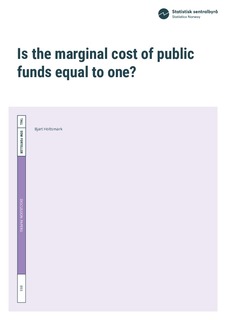Is the marginal cost of public funds equal to one?
Working paper
Permanent lenke
http://hdl.handle.net/11250/2593293Utgivelsesdato
2019-01-08Metadata
Vis full innførselSamlinger
- Discussion Papers [1003]
Sammendrag
In a recent article Bas Jacobs found that the marginal cost of public funds (MCF) is one when taxation gives second best resource allocation.
This conclusion is based on a claim that there are certain shortcomings with the standard definition of MCF, for example that the size and sign of the standard MCF measure is sensitive to the choice of the untaxed good. A less frequently used definition of MCF is therefore applied instead. If a lump-sum tax is a marginal source for public revenue and taxation is optimal, MCF is one with the proposed definition. The contribution of the present paper is two-fold. First, it finds the standard MCF-measure is not sensitive to the choice of the untaxed good. Second, it finds that the proposed alternative definition has undesirable properties, for example that it could give negative MCF-measures along the upward sloping part of the Laffer-curve and is sensitive to the choice of the untaxed good also in cases where this does not make sense. The present paper therefore concludes that there is a weak basis for the conclusion that MCF is one with optimal taxation.
